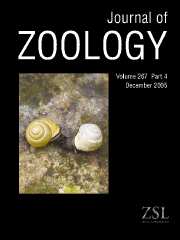Article contents
Discovery of red colobus monkeys (Procolobus badius) in the Niger Delta with the description of a new and geographically isolated subspecies
Published online by Cambridge University Press: 01 May 1999
Abstract
A distinctive and geographically isolated population of red colobus monkey Procolobus badius has been discovered in the Niger Delta within what was previously believed to be a discontinuity in the distribution of the species some 1200 km across. This Delta red colobus represents a new subspecies, P. b. epieni, most closely resembling the taxon on Bioko (P. b. pennantii) in such features as black hands and feet, and lack of orange-brown tones on head and neck, but differing in having whitish arms and hair whorls above the ears. It is less similar to subspecies on the mainland to the west or east (P. b. waldroni in Ghana and P. b. preussi in Cameroon, respectively), implying a complex zoogeographical history for the species. The Delta red colobus occupies an exceptionally low lying habitat of marsh forest, and its range lies within an area that had been independently identified as a centre of primate endemism, so it may have survived climatic vicissitudes of the Pleistocene in a Delta refuge. As it is confined to an area of about 1500 km2, it is now vulnerable to increasing human pressures.
- Type
- Research Article
- Information
- Copyright
- © 1999 The Zoological Society of London
- 13
- Cited by


